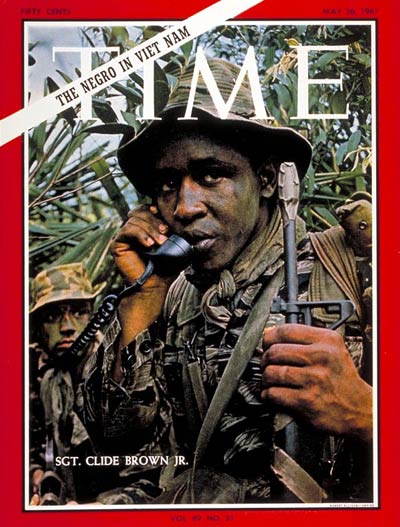
Milestone moments do not a year make. Often, it’s the smaller news stories that add up, gradually, to big history. With that in mind, in 2017 TIME History will revisit the entire year of 1967, week by week, as it was reported in the pages of TIME. Catch up on last week’s installment here.
In the wake of Muhammad Ali’s very public refusal to fight in Vietnam, TIME’s cover story took an in-depth look at the often paradoxical situation facing the African-American population in relation to the War in Vietnam. The story doesn’t escape without a few assumptions about race and gender issues in the U.S. that likely wouldn’t fly today (for example, the suggestion that black men wanted to fight in Vietnam as a “corrective” to the “matriarchal dominance” in their society at home), and it’s very easy to read it as taking a side — against protest — but it does a good job of presenting the many nuanced sides of a complicated issue.
First, the numbers: Though 70% of African-Americans who were drafted were rejected from the Army, the ratio of black combat troops to white ones was double that for the U.S. population as a whole, the magazine reported. Their rate of combat death was likewise higher. At the same time, there were disproportionately fewer African-Americans serving as officers — they were 5% of the officers but 10% of all Army troops — and, in their off time, troops tended to congregate in de facto segregated areas in Saigon.
Meanwhile, civil-rights leaders like Martin Luther King Jr. and public figures like Ali made the case that Vietnam was an example of “a ‘race war’ in which the white U.S. Establishment is using colored mercenaries to murder brown-skinned freedom fighters,” as TIME put it.
On the other side, there were men like Staff Sergeant Glide Brown Jr., exemplars of the fact that Vietnam was the first truly integrated conflict in U.S. military history. He was black, the men he commanded were not, and that didn’t seem to matter. Though African-American fighters had defended the United States since the earliest days of the nation and the military had officially been desegregated in the 1940s, in Korea segregation was still largely in practice.
For the men to whom TIME spoke, the numbers — which could also be read as the black man taking the brunt of the war’s burden — were evidence of inroads being made. “We are fighting over here against the Viet Cong and at home against discrimination,” said Capt. Clifford Alexander Jr., to TIME; “together we can win in both places.”
Lucky Lindy: Something I found remarkable about this essay in commemoration of the 40th anniversary of Charles Lindbergh’s solo transatlantic flight was the realization that Lindbergh was still alive when it was written. Yes, it’s not surprising if you think about it, but it’s a reminder that events that can seem to have taken place in a different world are often just one step removed from our own. As for Lindbergh himself, having had his reputation somewhat rehabilitated after having shown the world his worst side in the lead-up to World War II, when he spoke about the push for the U.S. to enter to war as a Jewish conspiracy, he was by then a very private man of 65 who had written about his sadness in the nuclear age at seeing “the aircraft I loved destroying the civilization I expected them to serve.”
Trash heap: In the nearly two decades between 1950 and 1967, the amount of trash in the U.S. had increased at a rate of double the increase in the population. A full-scale garbage crisis was approaching, traced largely to the increasing reliance on one-time-use packaging and products. Here’s how you know it was bad: the Mayor of San Francisco’s best suggestion was to send the garbage to the moon, which TIME assessed as something that “might not be such a bad idea.”
Parental advisory: Tipper Gore was not the first American parent to be shocked by a pop song’s lyrics. TIME reported on a campaign by radio broadcaster Gordon McLendon against songs that glorify “immorality in general.” Not content to direct his own stations to limit their playlists to songs that matched his morals, he advocated for “The Wax Party” — a second Boston Tea Party, this time to get rid of the records of British rock groups like the Rolling Stones. (“Aware that ‘teenage slang changes by the week,’ and that the hippies love to slip innuendoes past the censors, McLendon is appointing an ‘informal jury’ of consultants,” the magazine added. “It will have to include, he thinks, an ex-prostitute and an ex-addict to catch all the nuances.”)
First abortion: The first person had taken advantage of a newly liberalized Colorado abortion law. She was a married woman who had been raped, and who knew because her husband was sterile that her pregnancy was a result of the rape.
Great vintage ad: Encouraging readers to write letters to public officials is the latest way to sell paper.
Coming up next week: Robert Lowell and ‘Poetry in an Age of Prose’
More Must-Reads From TIME
- The 100 Most Influential People of 2024
- Coco Gauff Is Playing for Herself Now
- Scenes From Pro-Palestinian Encampments Across U.S. Universities
- 6 Compliments That Land Every Time
- If You're Dating Right Now , You're Brave: Column
- The AI That Could Heal a Divided Internet
- Fallout Is a Brilliant Model for the Future of Video Game Adaptations
- Want Weekly Recs on What to Watch, Read, and More? Sign Up for Worth Your Time
Write to Lily Rothman at lily.rothman@time.com